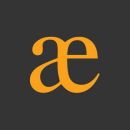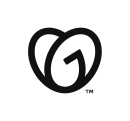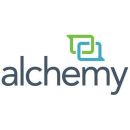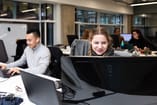What do the following six engineers have in common?
For starters, they share a love of creative freedom, attention to detail and opportunities to learn that come with the field. They love to build things with the end-user in mind and collaborate with their teams.
Oh, and they’re all women working in a male-dominated industry. Here are their stories: how they got here, what they’re building and why they think more women should join them.

Nadia Boumaza’s career began 28 years ago when she worked for a small startup. Today, Boumaza is a senior software engineer at Big Data and AI startup CognitiveScale. She followed her love for math (and her two older siblings) into the field.
What do you love most about engineering?
There is hardly ever a dull moment in software engineering. Since this field is constantly innovating with new technologies it also pushes one to constantly keep up to date and keep learning about new domains. I love creating something new and being helpful to other people.
What are some side projects you're working on?
Whenever my schedule permits, I confess to have another pet project — animal welfare. I try to volunteer my time helping local animal rescue organizations.
What unique experience/qualities do you bring to your team?
First and foremost a blend of experience, maturity and malleability. I was fortunate to work in several industries: financial services, healthcare, software, oil and gas, etc. which in turn exposed me to a vast variety of technical challenges. Although the journey enabled me to acquire a versatile skill set, I truly enjoy learning and am keen to widen my horizon of knowledge.
After completing her bachelor’s in art history at Baylor, Praecipio Consulting’s Jillian Flook worked in the nonprofit sector in management and events. During that time, she took classes in a variety of fields — including web development. Once introduced to the profession’s creative freedom and continuous learning, Flook decided to take the leap into coding by learning CSS, HTML and JavaScript.
What do you love most about developing?
I want to make cool products — both visually and functionally — and create meaningful experiences for my community. As a developer, I get to align those goals with my career. The creative aspect of development and engineering is very rich, and it is not just limited to the styling of the front end. There are potentially innumerable ways to solve any development challenge throughout the stack with code solutions and available tools.
What are some side projects you're working on?
Lately, most of my attention is on the Atlassian suite and software add-ons. To balance out that backend perspective, I have been working on animations in After Effects. I think it would be fun to use that skill to illustrate and animate instructions so that the issue at hand is more approachable and accessible to visual learners.
Why should more women get into software engineering?
More women need to know that you have unlimited potential in this field, career-wise. If you like stability and consistency, you can specialize and become an expert in your field. Conversely, if you are a newbie or a commitment-phobe, there are tons of new products to use to jumpstart your career. I am using development/software engineering to forge my own art form for a community that I both know and want to contribute to. As an added bonus, I am a more confident and outgoing person.
Ofelia Rodríguez is a software quality assurance engineer at Swipejobs and serves as event lead for Women Who Code Austin. She’s been doing quality assurance for about two years. In her role, she not only ensures that the product passes requirements, but that it also best serves the needs of its users.
How did you end up in quality assurance?
It was by accident and frankly, I was looking for different opportunities. I didn’t know quality assurance existed as a career. My friend sent my resume to a recruiter who was hiring for my current position. I went to the interview not knowing what to expect. However, I have always been detailed and inquisitive, which have helped me excel in my work. I didn’t always know I wanted to do quality assurance, but I knew I wanted to be in a role where I was working toward elevating the user experience while being in a technical role.
What are some side projects you're working on?
I am working on rewriting an ice cream locator app that I helped build last year. But, I am mainly focusing on learning a few JavaScript frameworks in order to expand my testing knowledge.
Why should more women get into quality assurance?
Quality Assurance is a great place for women who want to do technical work but aren’t necessarily interested in coding full time. I also think that quality assurance professionals make great developers. If interested in development full time they might find the transition to be easier. The great thing about quality assurance is that the barrier to entry is low, but the opportunities are endless. If you are interested in more of a technical role, automation is an option for you. If you’re more interested in exploratory testing, that’s an option too. I want more women in software testing because we use technology and products everyday. Why not test for things we end up being the consumer for?

Alysha Behn and Ellen Liu both are engineers at Main Street Hub. Behn, a software engineer II, has been developing for a decade, while this marks Liu’s first professional software development job that she’s been in for about two months. Liu said she was nervous at first to get started, but the Main Street Hub team was welcoming, supportive and helpful while she got ramped up.
How did you end up as a software engineer?
Behn: I grew up thinking I'd get an English or journalism degree and be a writer. My mom is an engineer (she does Oracle EBS/BI/big data consulting), so I didn't grow up lacking a role model in the industry, but my parents were really great about encouraging me to pursue whatever field I loved. I didn't even consider engineering until I took a computer science class my junior year of high school. I fell in love with it right away, so I decided pursue an engineering career instead.
Liu: I went into college as a pre-med Biomedical Engineering major. I started taking computer science classes for fun my sophomore year, and eventually ended up double majoring. After interning at a healthcare company my junior year, I realized that I wanted to pursue a career in tech as a software engineer.
What are some side projects you're working on?
Behn: I don't usually write code outside of work, so right now none of them are on Github! I'm working towards my goal of reading 75 books this year — I have 16 left — and our department has weekly tech talks (topics have ranged from an introduction to Postgres to a Bob Ross-style painting demo), so I'm working on a talk on hard AI. Once those goals are knocked out, I'm planning to write a knitting pattern generator that's loosely inspired by Jeff Donaldson's Stuxnet virus throw.
Liu: My latest side project involved using the Spotify API to analyze my current listening habits and provide recommendations for new music.
Why should more women get into software engineering?
Behn: Diverse teams end up working smarter and making better products. Women's use cases are ignored in technology design all the time, which is bad for consumers and bad for business. The more women we have working in the industry, the easier it becomes to make technology that has real widespread appeal. Additionally, now that there's a large spotlight on gender disparities in tech, which is so necessary, I worry that the message women are getting is that a career in software engineering inevitably means signing up for a lot of extra stress, bullying, and harassment. That spotlight is provoking a lot of positive change right now, and there are many, many healthy engineering cultures out there. I've never been more optimistic about the sustainability of a career in engineering.

Both a full stack developer at Alchemy Systems and a web development bootcamp instructor at Austin Community College, Karen Kelly has been a developer for three years. Her vast array of experiences in sales, and as a commercial print shop owner, world traveler, musician, actor and teacher have helped her bring different perspectives to a field that needs it. Her interest in UI//UX design doesn’t hurt, either.
How did you get into software engineering?
After I finished college (BA, Psychology), I worked at several software companies for about 14 years as a sales person. It was during this time that I met lots of awesome women who are programmers, database administrators and tech support. I wanted to be like them, so I quit my job to learn how to code.
I spent a couple of years at ACC learning the basics of CS and programming, then joined Galvanize’s 6-month immersive web development bootcamp. About a month after I graduated from Galvanize, I joined Alchemy Systems.
What do you love most about developing?
I love that it’s challenging and interesting and that I get to learn new stuff all the time. I’ve always loved puzzles and problem solving and that’s all programming is when you get to the heart of it. I love that I can use my creativity to make programs that are both aesthetically beautiful and functionally awesome.
Also, it’s such an amazing feeling of accomplishment and pride when you solve a problem you’ve been working on.
Why should more women get into software engineering?
One of the biggest is that women need to see other women in technical roles. If I didn’t know the women developers at the software companies I worked for in the past, it may have never occurred to me that I could be a developer. It’s invaluable for people to see themselves through people that are like them. This is why more women, more people of color and more LGBTQ people need to get into software engineering if it interests them.
Specifically for women, more women in engineering means more amazing support systems for women like Women Who Code. WWC helped me so much in becoming a better developer. They helped me gain the confidence and skills I use every day in my job.
Responses have been edited for clarity and length. Photos from participants.








